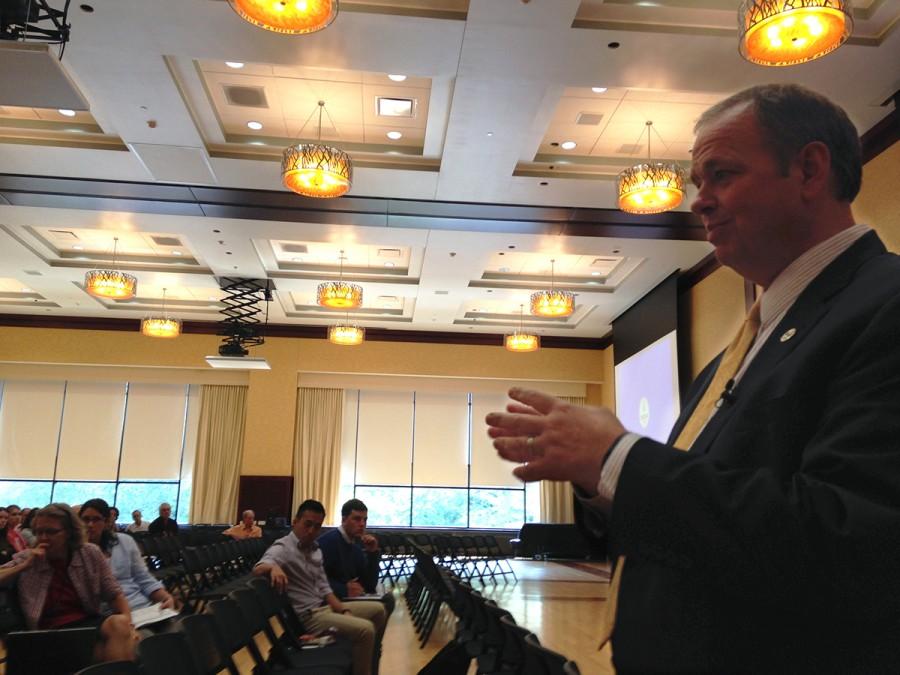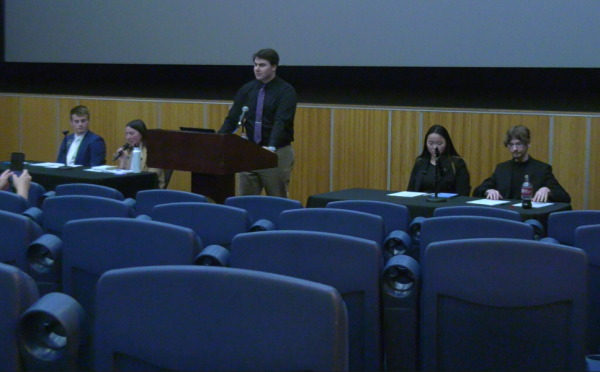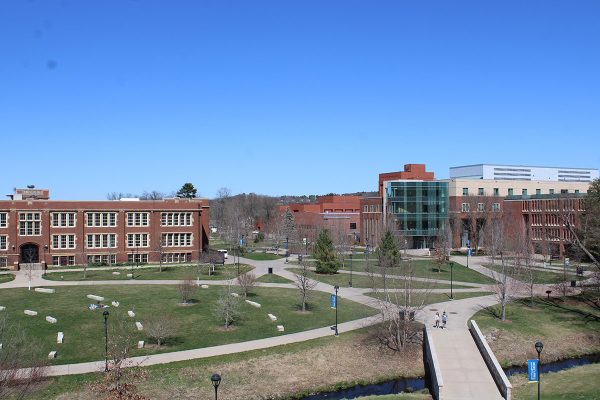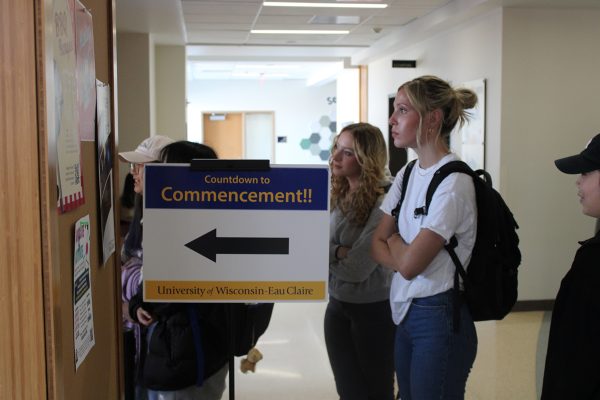Campus in transition
University prepares for finalized budget cuts
More stories from Lauren French
Photo by Lauren French
Chancellor Schmidt talks budget cuts with a group of faculty and staff on Aug. 27 in the Ojibwe Ballroom of the Davies Center.
September at the University of Wisconsin-Eau Claire is traditionally a time for new beginnings – new students have arrived, university staff are preparing for the semester and classes are starting.
But perhaps the newest feature to the university this year is unprecedented budget slashes, coupled with a continued two-year tuition freeze, and the university’s plan to accommodate it.
The University of Wisconsin System Board of Regents released the finalized $250 million UW System-wide budget cut this summer – $50 million less than Gov. Scott Walker’s original proposal.
While the cuts are less than first proposed, UW-Eau Claire has had to come up with ways to combat a tight budget. These include department consolidations, faculty reductions and larger class sizes.
Supporters of the cuts think it will be good for the state of Wisconsin as a whole, and others think it will only hurt the university. Here’s what you need to know about the cuts and UW-Eau Claire this year.
Where we are now
Over the course of two years, UW-Eau Claire will bear $12.2 million of the $250 million system-wide cuts.
Before the first day of class, the university identified ways to accommodate for 98 percent of the budget cuts. Total numbers don’t add up to the exact savings because of reduction overlaps.
Consolidated services — $4.2 million.
Unfilled positions — $2.3 million.
Limited positions — $1.3 million.
Alternative funding — $1.8 million.
Voluntary Separation Incentive Program — $4.1 million.
The Voluntary Separation Incentive Program, a plan that includes half-a-year’s pay and an agreement to leave the university voluntarily, included 98 people. Overall, the university cut 69 full-time equivalent positions from classrooms, which represents almost 90 people, according to a fact sheet from the Chancellor’s office.
College and department budgets have been reduced, too – the College of Business lost about 20 percent of its funding this year, and it isn’t the only one.
“These cuts will impact absolutely every corner of the university,” Chancellor James C. Schmidt said in a budget update presentation last week. “No one was spared.”
To help maintain a positive student experience,
Schmidt said he plans to create four centralized centers: an Administrative Support Center, a One-Stop Student Services Center, an Advising and Student Success Center and a consolidation of creative services.
The university also plans to consolidate maintenance and custodial services, create an academic master plan to focus teaching resources, and develop an equity, diversity and inclusivity plan.
The university assembled rapid action task forces to take care of curriculum, academic workload, student services and administrative redesign. The task forces consist of faculty, staff and student senators.
Student Body President Jake Wrasse said student senators will be a part of the task forces to represent student concerns.
“He (Chancellor Schmidt) has been very open, very good about soliciting input from students,” Wrasse said.
Uncertanties remain
Despite all the plans for this year and the next, students and staff alike have uncertainties about the cuts and the effects it will have on the school.
Schmidt said the university will have to offer fewer class electives, class sizes will be larger and departments might be understaffed until they’re able to effectively consolidate.
“With all the innovation we’ve done, with all the creativity we’ve tried to bring to bare, it hurts, still,” Schmidt said. “And it will affect us.”
Not everyone thinks the cuts are bad, though – some, like junior social work major Marie Lau, think the university was too loose with its spending before, and the cuts will make for good savings.
However, Lau said she disagrees with Gov. Walker’s choice to build a completely new stadium for the Milwaukee Bucks basketball team.
“I think the budget cuts are a good thing, but the results of them are bad,” Lau said.
Assistant Chancellor of Facilities and University Relations, Mike Rindo, is leading the facilities restructuring effort. He said his biggest caution moving forward is the lack in expertise due to the faculty and staff reductions.
“When you lose that kind of experience,” Rindo said, “there are going to be gaps in our knowledge.”
In some cases, not only are valuable faculty missing, entire majors and programs will have to go. Robin Jungwirth, a fifth-year Spanish linguistics major, is part of the last group of students who will be able to graduate with that major, as the program will soon cease to exist.
She said she’s worried about those who still have years to go before they graduate.
“I’m worried for the students who are affected by (the cuts),” Jungwirth said. “And the professors, too.”











